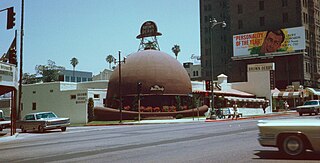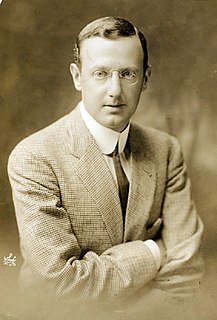Herbert K. Somborn | |
|---|---|
| Born | 1880 |
| Died | January 2, 1934 (aged 53–54) |
| Occupation | |
| Spouse | |

Herbert K. Somborn (1880 - January 2, 1934) was an American film director and producer, and restaurant owner. [1]
Herbert K. Somborn | |
|---|---|
| Born | 1880 |
| Died | January 2, 1934 (aged 53–54) |
| Occupation | |
| Spouse | |

Herbert K. Somborn (1880 - January 2, 1934) was an American film director and producer, and restaurant owner. [1]
Somborn was the president of Equity Pictures, a film distribution company. [2] He married Gloria Swanson in a civil ceremony at the Alexandria Hotel in Los Angeles on December 20, 1919. [3] [4] They stayed in the hotel after the marriage, but as Equity was in financial difficulties they had to move out in 1920 to an apartment in Hollywood. [5] They had one daughter, also named Gloria, born on October 6, 1920. [1] [6] In 1921 Somborn wrote to Swanson to say that he was leaving her. [7] In March 1923 Somborn alleged that Swanson had committed adultery with fourteen men, including Cecil B. De Mille, Jesse Lasky, and Adolph Zukor, and asked for a $150,000 settlement. [8] Scandals involving Fatty Arbuckle and Bill Taylor had led to the formation of the Association of Motion Picture Producers and Distributors of America, partly to manage public perception of the film industry's morals, run by Will Hays. Swanson was concerned that a divorce scandal would wreck her career, and Lasky faked a telegram from Hays suggesting that it would also be disastrous for the entire industry. Swanson agreed to negotiate with Somborn, and the final divorce papers granted him $70,000. [9] They divorced on August 9, 1922 [3] but remained friends. [1]
Somborn opened the Brown Derby restaurant on Wilshire Boulevard, using the settlement money; the restaurant building was shaped like a two-story derby hat. [10] It became a favourite eating place for people in the movie industry, including Wallace Beery, Swanson's first husband. [10] [11] Somborn eventually owned three Brown Derby restaurants in the Los Angeles area. [1]
He died from complications of a kidney ailment. [1]

Sunset Boulevard is a 1950 American black comedy film noir directed and co-written by Billy Wilder, and produced and co-written by Charles Brackett. It was named after a major street that runs through Hollywood, the center of the American film industry.

Adolph Zukor was a Hungarian-American film producer best known as one of the three founders of Paramount Pictures. He produced one of America's first feature-length films, The Prisoner of Zenda, in 1913.

Wallace Fitzgerald Beery was an American film and stage actor. He is best known for his portrayal of Bill in Min and Bill (1930) opposite Marie Dressler, as General Director Preysing in Grand Hotel (1932), as Long John Silver in Treasure Island (1934), as Pancho Villa in Viva Villa! (1934), and his titular role in The Champ (1931), for which he won the Academy Award for Best Actor. Beery appeared in some 250 films during a 36-year career. His contract with Metro-Goldwyn-Mayer stipulated in 1932 that he would be paid $1 more than any other contract player at the studio. This made Beery the highest-paid film actor in the world during the early 1930s. He was the brother of actor Noah Beery and uncle of actor Noah Beery Jr.

Gloria May Josephine Swanson was an American actress and producer. She first achieved fame acting in dozens of silent films in the 1920s and was nominated three times for the Academy Award for Best Actress, most famously for her 1950 return in Billy Wilder's Sunset Boulevard, which also earned her a Golden Globe Award.

William Harrison Hays Sr. was an American Republican politician.

The Ambassador Hotel was a hotel in Los Angeles, California. Designed by architect Myron Hunt, the Ambassador Hotel formally opened to the public on January 1, 1921. Later renovations by architect Paul Williams were made to the hotel in the late 1940s. It was also home to the Cocoanut Grove nightclub, Los Angeles’ premier night spot for decades; host to six Oscar ceremonies and to every United States President from Herbert Hoover to Richard Nixon.

Brown Derby was a chain of restaurants in Los Angeles, California. The first and best known was shaped like a derby hat, an iconic image that became synonymous with the Golden Age of Hollywood. It was opened by Wilson Mizner in 1926. The chain was started by Robert H. Cobb and Herbert K. Somborn in the 1920s. The original Brown Derby restaurants had closed or had been converted to other uses by the 1980s, though a Disney-backed Brown Derby national franchising program revived the brand in the 21st century. It is often incorrectly thought that the Brown Derby was a single restaurant, and the Wilshire Boulevard and Hollywood branches are frequently confused.

William Wallace Halleck Reid was an American actor in silent film, referred to as "the screen's most perfect lover". He also had a brief career as a racing driver.

Hollywood is a multi-BAFTA award winning 1980 documentary series produced by Thames Television which explored the establishment and development of the Hollywood studios and their impact on 1920s culture. At the 1981 BAFTA television awards, it won Best Factual Series, Best Film Editing and Best Graphics.

Herbert Brough Falcon Marshall was an English stage, screen and radio actor who starred in many popular and well-regarded Hollywood films in the 1930s and 1940s. After a successful theatrical career in the United Kingdom and North America, he became an in-demand Hollywood leading man, frequently appearing in romantic melodramas and occasional comedies. In his later years, he turned to character acting.

Jesse Louis Lasky was an American pioneer motion picture producer who was a key founder of what was to become Paramount Pictures, and father of screenwriter Jesse L. Lasky Jr.

Sam Katzman was an American film producer and director. Katzman produced low-budget genre films, including serials, which had disproportionately high returns for the studios and his financial backers.

Joseph Herman Pasternak was a Hungarian-American film producer in Hollywood. Pasternak spent the Hollywood "Golden Age" of musicals at MGM Studios, producing many successful musicals with female singing stars like Deanna Durbin, Kathryn Grayson and Jane Powell, as well as swimmer/bathing beauty Esther Williams' films. He produced Judy Garland's final MGM film, Summer Stock, which was released in 1950, and some of Gene Kelly’s early breakthrough roles. Pasternak worked in the film industry for 45 years, from the later silent era until shortly past the end of the classical Hollywood cinema in the early 1960s.

Lila Lee was a prominent screen actress, primarily a leading lady, of the silent film and early sound film eras.

The Kaufman Astoria Studios is a film studio located in the Astoria section of the New York City borough of Queens. The studio was constructed for Famous Players-Lasky in 1920, since it was close to Manhattan's Broadway theater district. The property was taken over by real estate developer George S. Kaufman in 1982 and renamed Kaufman Astoria Studios.

Film Booking Offices of America (FBO), also known as FBO Pictures Corporation, was an American film studio of the silent era, a producer and distributor of mostly low-budget films. It was founded in 1920 as Robertson–Cole (U.S.), the American division of a British import–export company formed by the English-born Harry F. Robertson. Robertson-Cole bought the Hallmark Exchanges from Frank G. Hall in 1920. Exhibitors-Mutual/Hallmark had distributed Robertson-Cole product, and acquiring the exchanges gave them the right to distribute their own films plus Hall's product, with the exception of Charlie Chaplin reissues which he had the rights to.

Joseph Stephenson "Steve" Crane was an American actor and restaurateur. A Columbia Pictures actor in the early 1940s, Crane opened the Luau, a popular celebrity restaurant, in 1953 and established a successful 25-year career in the restaurant industry. In addition to his own accomplishments, Crane is often remembered as Lana Turner's twice ex-husband.
Richard Rosson was an American film director and actor. As an actor, he was known for the nearly 100 films he was in during the silent era. As a director, he directed the logging sequences in the 1936 film Come and Get It.

Fine Manners is a 1926 American black-and-white silent comedy film directed initially by Lewis Milestone and completed by Richard Rosson for Famous Players-Lasky/Paramount Pictures. After an argument with actress Gloria Swanson, director Milestone walked off the project, causing the film to be completed by Rosson, who had picked up directorial tricks while working as an assistant director to Allan Dwan. The success of the film, being Rosson's first directorial effort since he co-directed Her Father's Keeper in 1917 with his brother Arthur Rosson, won him a long-term contract with Famous Players-Lasky.

Bluebeard's 8th Wife is a lost 1923 American silent romantic comedy film produced by Famous Players-Lasky and distributed by Paramount Pictures. It was directed by Sam Wood and stars Gloria Swanson. The film is based on the French play La huitième femme de Barbe-Bleue by Alfred Savoir which is based on the Bluebeard tales of the 15th century. The play ran on Broadway in 1921 starring Ina Claire in the Swanson role.